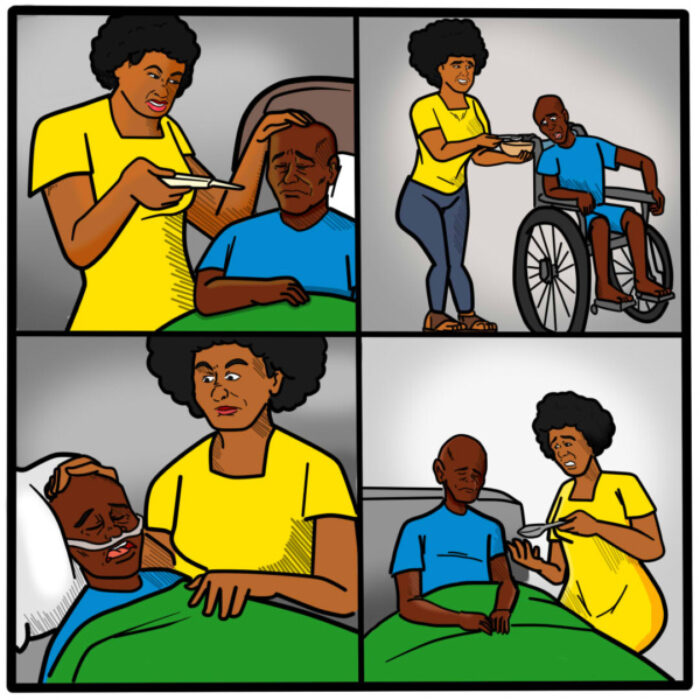Are men the overlooked reason for sexual dysfunction among married Nigerian women?
By Professor Marilyn Okeke
The prevalence of sexual dysfunction among married Nigerian women is alarming.
Estimates vary, but somewhere between 63% and 80% of married Nigerian women reported recurrent and persistent sexual problems. The list of problems include:
- Lack of sexual desire and sexual interest or low libido.
- Unable to become sexually aroused or excited during sex.
- Inability to have an orgasm.
- Pain during sex.
- No sexual pleasure or satisfaction.
Contrary to what some Nigerian husbands may think, sex is not pleasurable to the majority of their wives; it is not a physically and emotionally rewarding experience for these women.
Warning: This article contains sexually explicit content. If that makes you break out in rashes, stop reading now.
OK, then.
The World Health Organization (WHO) identified sexual dysfunction as a common but under-reported problem with significant negative impact on women’s sexual and reproductive health in Nigeria and globally. In fact, sexual dysfunction is a serious public health issue and sociocultural problem. And I recommend urgent policy, community and individual intervention.
Dozens of married women interviewed for this article — like the women in the studies cited below — have resigned themselves to relying entirely on porn or other online stimuli to satisfy their sexual desires and pleasure. This suggests that the sexual dysfunction some Nigerian women suffer is not completely a medical problem as some have suggested but also a marital problem — which is the focus of this article.
The archaic cultural belief that female sexual pleasure is dangerous, undesirable, or inappropriate may contribute to the high prevalence of sexual dissatisfaction among Nigerian women. The Nigerian patriarchy culture restricts female sexual expression and often makes women feel ashamed or guilty about sexuality. Cultural and religious-based circumcision of females is a contributor, among others listed below.
Let’s be clear, sex isn’t the sole form of fulfilling marital bliss and certainly isn’t a salve for broken marriages. Still, it should be seen as a critical part of women’s health, marital well-being and good life.
And here’s a thought-provoking question: If women can’t find sexual pleasure inside their marital bedroom, can they be tempted or even compelled to seek it outside?
Therefore, in this 2-part series on Women’s Health, I examine the prevalence of sexual dysfunction among married Nigerian women, its causes and remedies. I focus on the sociocultural and relational factors which scholars and practitioners have found to be major contributing factors to female sexual dysfunction in Nigeria.
How common is sexual dysfunction among women in Nigeria?
Among Nigerian women, studies have noted significant decreased libido, undercharged arousal, inability to achieve orgasm, and painful intercourse or dyspareunia as the four broad types of sexual dysfunction.
In a rigorous and major study of 480 married female patients of reproductive (18 – 49 years) age at the University College Hospital (UCH), Ibadan, 80% of the women had sexual dysfunction. The researchers reported that the most common sexual dysfunctions were a lack of sexual desire (99.4%), no arousal (95%), lack of sexual satisfaction (93.5%), inability to achieve orgasm (92.5%) and painful intercourse (33.5%).
The majority of the women (57%) in this groundbreaking study were college educated. This is likely because women that are educated are more likely to be aware of the signs and symptoms of sexual dysfunction and more readily to admit to it when asked. This result was comparable to the study done in South-eastern Nigeria in 2014 in which the highest association was found among women who were married and co-habiting.
In a robust study of 384 female patients of reproductive age in Obafemi Awolowo University Teaching Hospital Complex, Ile-Ife, Fajewonyomi and fellow researchers found that of the 384 female patients interviewed, 63% were sexually dysfunctional and 63.6% experienced inability to achieve orgasmic satisfaction among other problems.
In another sexual dysfunction research, Ojomo, Thacher and Obadofin investigated sexual problems among 283 female patients at the university of Jos. They found that 71% of Nigerian women in their study had one or more sexual problems. The specific sexual problems were: 39% had a desire problem, 40% an arousal problem, 31% a sex pain problem and 55% an orgasmic problem. This cohort was younger than the UCH patients.
In yet another important study involving 500 females recruited randomly at the University of Nigeria, Enugu Campus, the researchers found that prevalence of female sexual dysfunction was 53.3%. The highest prevalence of 73.3% occurred in the 41-50 years age group; married and living together was 56.4% and those who had postsecondary education was 56.1%.
Combined with other studies, these results suggest that educated, young and vibrant married women suffer from sexual dysfunction across the nation. The older the marriage, the more a woman suffers one or more sexual dysfunction.
Also, great proportion of the women reported being sexually abused or had repeated forced sexual intercourse by their husband. Further, the level of crisis in the relationship was identified as a factor in sexual problems among Nigerian women.
To put it bluntly, the majority of married Nigerian women have little or no sexual motivation, interest or desire to engage in or continue sexual activity knowing aforehand that the satisfaction will not be there for them. The satisfaction accrue only to men; sex is not mutually beneficial in Nigeria’s male-centered sexual regime.
In a sense, Nigerian women want Nigerian men to understand that mutually satisfying sexual activity strengthens the bond between them, increasing their long-term quality of the relationship.
In a sex-negative society and patriarchal culture like Nigeria, which views the function of sex as essentially procreative and for male satisfaction, we tend to reject a wider self-indulgent pleasure role for women.
What are common causes of sexual dysfunction among married Nigerian women?
While underlying health issues such as depression, sexually transmitted disease, vaginal atrophy, hormonal disorders, medication, and other gynecological-related malignancies may contribute to sexual problem, there are significant sociocultural and relational factors often under-reported by women.
There’s a rich bank of evidence, including my interviews, confirming link between female sexual problems and what husbands do or don’t in their marital relationship. The manmade (husband-made) triggers include:
- Uncaring and selfish sexual behavior by husband.
- Lack of foreplay and tenderness during sexual activity.
- Lack of emotional support at home.
- Inadequate stimulation during sexual activity.
- Unromantic husband.
- Toxic and stressful relationship.
- Marital neglect and nonchalant attitude of husband.
- Previous sexual abuse or forced sexual intercourse by husband.
- Stigma and inhibition from previous painful sexual activity.
- Excessive domestic duties performed by women.
- Competition with outside mistresses and among wives in a polygamous relationships.
- Unattractive husband who turn-off wives.
- Erectile dysfunction or premature ejaculation by husband.
- A culture of male dominance where women are submissive to the sexual demands of the husband.
In my own examinations, I spoke to dozens of married women in Nigeria for whom sexual problems are the defining characteristics of their daily marital life. I found sexual problems shaped the quality of their lives and relationships with husbands. Many attributed their anxieties and depressive episodes and social stigma to sexual problems with husbands.
What to Do — How To Reduce The Prevalence Of Sexual Dysfunction Among Nigerian Women
In addition to treating the underlying medical problems, we must pay attention to the psychological, cultural, social and relational issues identified in this article. Sexual problems can be solved, at least partly, at the level of individual marriages and bedrooms. Let’s begin with Nigerian men, the husbands.
There is a rich bank of evidence that sexual desire in women is responsive rather than spontaneous. Therefore, if sex partners are unable or unwilling to provide stimuli to elicit sexual response, then the ability of women to find and respond to sexual arousal and subsequent sexual desire will be subdued.
Here is the rare opportunity for couples to do something for the betterment of their love life that involves nothing more than indulging in mindfulness, love, care and mutually satisfying sex life.
- Nigerian men should learn about their wive’s anatomy and ways to arouse her.
- Couples should work together to improve communication, including about sex and satisfaction.
- Engage in many types of sexual activities: For example, foreplay may include stroking and kissing responsive parts of the body and touching each other’s genitals intimately before initiating intercourse. It helps lessen anxiety and build desire.
- Make time for each other outside sex. Couples who talk to each other frequently are more likely to want and enjoy sexual activity together.
- Take your time during sexual activity. Intimate sexual experience is not a sprint. The faster, is not always the better. Take your time to set the stage and get your partner in the mood and then enjoy sexual partnership to the satisfaction of both partners.
- Health issues which inhibit sexual desire and motivation must be openly discussed by both partners and appropriate medical help should be considered.
- Seek professional sex therapy to help deal with psychological and cultural issues that affect your sexual life.
- Seek marriage counseling or therapy, especially with a professional who specializes in sexual health.
- There’s no better cure than a loving, caring and respectful relationship.
- If there is a medical cause, it must be diagnosed and treated by specialists.
In sum, the sexual lives of Nigerian women are highly impacted by sexual dysfunction, and a number of sociocultural factors play a role in the prevalence of sexual dysfunction. It’s time for direct and open national discussion on this epidemic. It’s a major public health issue we can no longer afford to overlook. Women deserve sexual health and pleasure as well as men. Sexual health and satisfaction is a human rights issue. Interventions that help to improve women’s sexual satisfaction may have the added benefit of happy marriage and healthy sexual relationship.




